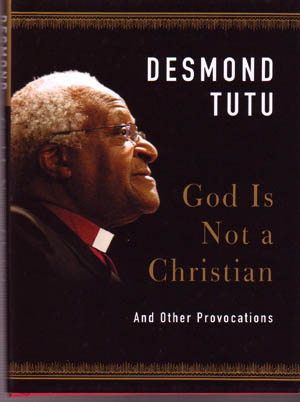Meet the Author and Editor
The Most Rev. Dr. Desmond Tutu was the first black person to serve as General Secretary of the South African Council of Churches and the first to serve as Anglican Archbishop of Cape Town, South Africa. Tutu is best known for his tireless and effective work to end apartheid. He received the Nobel Peace Prize in 1984, the Albert Schweitzer Prize for Humanitarianism in 1986, the Gandhi Peace Prize in 2005, and the Presidential Medal of Freedom in 2009. Tutu currently serves as chair of The Elders, a group of global leaders who campaign for justice and human rights worldwide. He is the author of several books including Made for Goodness: And Why This Makes all the Difference – with Mpho Tutu (2011), God Is Not a Christian And Other Provocations – edited by John Allen (2011), and God Has a Dream: A Vision of Hope for Our Time (2005.)
John Allen is the managing editor of allAfrica.com and previously served as the director of communications for South Africa’s Truth and Reconciliation Commission. He is the author of the authorized biography of Desmond Tutu: Rabble-Rouser for Peace (2006).
For over a generation Desmond Tutu has been one of the most influential voices speaking for reform on behalf of those who would otherwise be silenced. John Allen’s knowledge of Tutu, especially from his experience as his biographer, and editorial expertise, enabled him to craft a diverse collection of Tutu’s work in a single book. God is Not a Christian is comprised of “a disparate range of material: off-the-cuff interventions, answers to journalists’ questions, letters, and both abbreviated and lengthy excerpts from speeches, sermons, and other writings” (p.xv). Allen arranged these materials into four parts (1: Advocate of Tolerance and Respect, 2: International Campaigner for Justice, 3: Voice of South Africa’s Voiceless, and 4: South Africa’s Conscience), each with multiple chapters. Every item includes a brief introduction that provides the reader with background information about its original usage.
Tutu’s words are practical, powerful, and provocative. Tutu argues rather convincingly, based in large part on the equality of persons who have all been created in God’s image, for Christian leadership in global human rights issues by humble servant leaders. In sharing pieces of his own life story and understanding of God’s preferential option for the poor, Tutu’s texts serve as invitations to the whole body of Christ and the global human family to continue pressing forward in seeking justice and human rights for all people.
So What?
Tutu has long been an advocate of equality for all people without regard to race, gender or sexual orientation. In the book’s first chapter, “God is Clearly Not a Christian: Pleas for Interfaith Tolerance,” he makes several assertions including:
God is clearly not a Christian. His concern is for all his children. (p.12)
To claim God exclusively for Christians is to make God too small and in a real sense is blasphemous. God is bigger than Christianity and cares for more than Christians only. (p.14)
People of religion have no choice in the matter. Where there is injustice and oppression, where people are treated as if they were less than who they are – those created in the image of God – you have no choice but to oppose, and to oppose vehemently and oppose with all the force that you have in your being, that injustice and oppression. (p.19).
Do you agree or disagree with each of these three statements? Why?
How has Desmond Tutu’s work and/or the work of other human rights activists encouraged you to get involved in working for equal rights for all persons?
How does your faith inform your thinking about human rights?
Desmond Mpilo Tutu (ed. by John Allen). God Is Not a Christian And Other Provocations. HarperOne, 2011. ISBN: 9780061874628.
